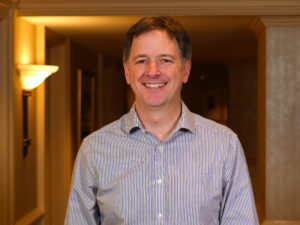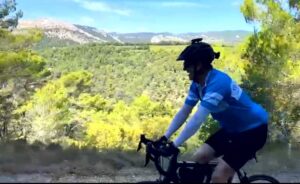
Dr. Michael Caffaro joined the RhPAP Board of Directors in 2022 as a representative for the College of Physicians and Surgeons of Alberta, where he serves as Assistant Registrar. He is tasked with overseeing Registration and the Practice Readiness Assessment programs, which review and assess physicians as they begin medical practice. Dr. Caffaro previously practised as a family physician in Hinton for 22 years. Rural Health Beat coordinator, Lorena Franchuk, recently chatted with Dr. Caffaro about his time in Hinton and his desire to encourage other health professionals to try rural practice.
LF: Tell me about your background and where you studied to become a physician.
MC: I was a west Edmonton kid, born and raised. For full disclosure, I was actually studying plants when I got into med school. I was a botanist and as soon as I applied to medicine, I thought “we will see what happens.” Sure enough, I got into the University of Alberta.
LF: Did you know early on that you wanted to practise rurally?
MC: My uncle Paul graduated from medical school in 1974 from the U of A. He was a family doctor in Slave Lake for 37 years. I spent a lot of time with Paul and that’s what did it for me. I saw everything he did, how he did it, where he did it. The fact that he lived in a community where they appreciated him and he appreciated them, that’s what sold me.
LF: How did you end up in Hinton?
MC: I received a ‘cold call’ that they were looking for someone to help in family practice, so I drove out one weekend in May 1993 and I started working there July 12. My wife and I arrived at the right time, in the right place, and with the right people. A whole bunch of us in the health-care community raised our kids together. It was the sweet spot—just a fabulous time to both practice medicine and live in a rural community. We hit it just right.
LF: What was your physician experience like practising in a rural area?
MC: I had to pinch myself most days and say, “I’m actually getting paid to do this. This is awesome.” It was a different challenge every day. It was a small community of 10,000 people, but you got to know people in town, you got to know your patients. You appreciated them, they appreciated you.
A patient could tell me, “Mike, I didn’t like the way you said this the last time and I would say, “Okay, tell me how I should have done it differently? What can I do better the next time?” It was a very easy practice that way because I knew patients could tell me the truth. And I knew I could reciprocate.
We did a lot of things—delivering babies, surgery, emergency room, community-based practice, occupational medicine, educational sessions for high school kids with trauma prevention programs and interacting with RCMP and firefighters.
LF: What were some of the challenges you faced with a rural practice?
MC: We went from a traditional town where you had two clinics that were competing with each other to a two-clinic town where we were cooperative. There was enough work for everybody.
There was always the challenge of being three hours down the highway from Edmonton. When we recruited, we brought in people with extra skills—anesthesiology, obstetrics training, and surgical. In my time in Hinton, so almost 22 years, we had only one weekend where we couldn’t deliver a baby [due to staffing issues.] It was part of this can-do attitude, someone’s got to do this work.
One of the other ways we met the challenges when it came to recruiting was really simple. We were a teaching site; we took both medical students and residents. Yes, it’s a little more work…. More than half of our medical staff were former students or residents who had come through Hinton training. We made a very dedicated effort to be involved with teaching both the undergraduate and post-graduate degrees.
On occasion being a small-town physician can be absolutely tragic. One thing I got really used to was to learn to cry with families and that it is okay for a physician to go to a funeral…. And in a small town, the best way you can demonstrate [compassion and empathy] is to show you care.

LF: You bring both rural and urban health-care experience to the RhPAP Board of Directors. How does your rural expertise help you in your role?
MC: The fact that I worked rural for 22 years is a big deal because that means there is someone who has walked in the same shoes.
Also, I was around when the Rural Physician Action Plan [before RhPAP] was founded back in the mid ’90s. I’ve got a bit of a sense of the history of the organization. Unfortunately, some people still assume it’s the Rural Physician Action Plan, and not the Rural Health Professions Action Plan [which was expanded beyond physicians to include other health professionals in 2017.] Helping to steer people away from things that are physician-centric is an additional advantage I maybe have in my role from my historical perspective.
As a regulator, I’m expected to help members of all professions cooperate with each other. We work with nurses, [licensed practical nurses], occupational therapists, physiotherapists, pharmacists. I work with other regulators, and we are all trying to get to the same place where the [health] team can take care of all Albertans irrespective of what the actual initials are after their name.
LF: What advice do you have for anyone interested in becoming a rural practitioner, especially those that don’t have a rural upbringing or connection like you did with your uncle?
MC: You must dive in with both feet and give it a try. The safest place to do this, whether you’re a physician, a nursing student, physiotherapist or student, is the exposure has to be outside of the metro areas. Go and do [rural] electives and visit rural communities to see what happens care wise. That’s how you stimulate the appetite with opportunities. And not just health-care—you can also do mountain biking at the Nordic Ski Centre during the summer, or you can go skiing on 30 miles of groomed trails in the winter.
The best time to do it is when you are a trainee, a student, or when you are in postgraduate training, because you have a bit of a protective cocoon.
LF: Why is rural health care still so important to you?
MC: That is where a good chunk of our population lives and it’s where another good chunk of our population goes to recreate. Whether you live in rural Alberta or you go because that’s where you like to visit, the absence of health care makes for an extraordinarily bleak landscape.
